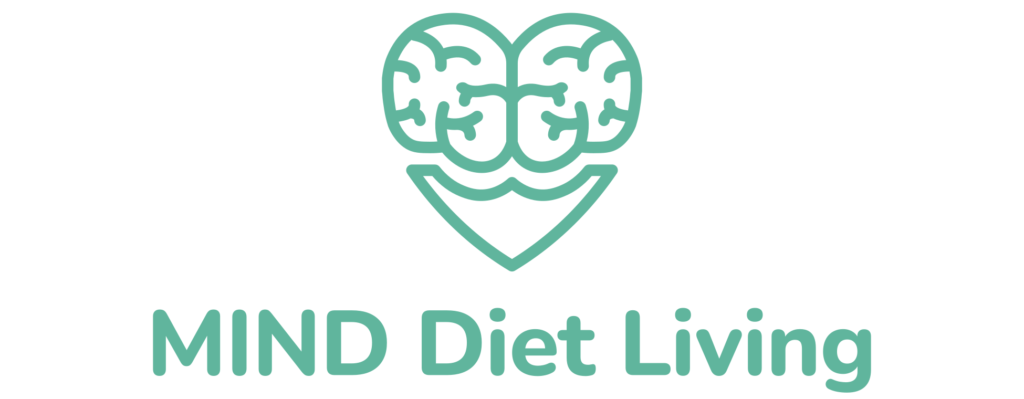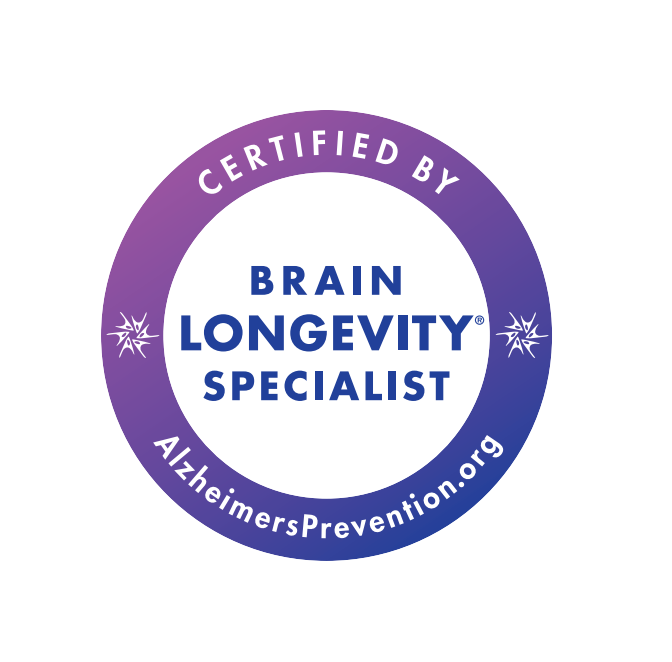As Alzheimer’s drugs fail or provide a modest-at-best slowing of symptoms, there has been an explosion of research into Alzheimer’s prevention in the last decade or two. I’m not sure if a disease as complex as dementia will ever be able to be cured with a pill. Maybe hard-working scientists will have a breakthrough, but I’m not betting my future on it. The good news is that there are lots of things we can do now to help prevent Alzheimer’s in the first place and help slow the decline if it does develop. The even better news is that it is never too early and never too late to start. And you don’t have to wait decades to see results; these things will help improve your cognition and overall health now.
Different organizations have different ways of organizing the existing Alzheimer’s prevention advice. I was certified as a Brain Longevity Specialist by an organization called Alzheimer’s Research and Prevention Foundation (ARPF), and I find their Four Pillars the simplest and easiest to remember. Here they are, along with my personal bonus pillar.
ARPF Four Pillars of Alzheimer’s Prevention
Pillar 1: Diet and Supplements
I’ve already discussed how effective the MIND Diet is, but let’s talk about why scientists think it works. To sum it up: certain foods contain anti-inflammatory substances, and some contain antioxidants.
Anti-inflammatory substances prevent or mediate chronic inflammation, a known risk factor for developing dementia.
Antioxidants protect our cells (including our precious brain cells) from damage by oxidation, which is a by-product of normal metabolism.
Plant foods are generally a great source of both anti-inflammatories and antioxidants. The MIND Diet recommended foods are rich in these desirable substances, as well as vitamins and minerals that help improve brain health and function. The “occasional” MIND Diet foods are ones that tend to contribute to inflammation and oxidation, instead of fighting them. It is important to eat a variety of fruits and veggies in addition to the ones recommended by the MIND Diet so you get an array of antioxidants and anti-inflammatories.

The ARPF does discuss dietary supplements to help improve brain health. It is beyond my scope to do so here, but this is something you can discuss with your medical provider. Find ARPF’s supplement recommendations here if your provider is not familiar with them. Supplements are not a substitute for a well-rounded diet with a variety of plant foods. The antioxidant and anti-inflammatory properties of plants are not necessarily found on the label of a vitamin bottle; they are often intrinsic to the plants themselves. Try to eat the whole food whenever possible.
Pillar 2: Stress Management
Hopefully it is not news to you that chronic stress is bad for your health, but let’s talk about why, how that is related to Alzheimer’s risk, and what you can do about it. Stress contributes to inflammation, anxiety, and depression, and increases production of a substance known as cortisol. As we saw above, inflammation is a risk factor for developing Alzheimer’s, and so are anxiety and depression. Treating these conditions with a mental health provider is important to reduce the risk of later developing dementia. If typical stress management techniques do not alleviate symptoms or feelings of anxiety or depression, please seek help from a mental health provider.
Let’s get back to that substance called cortisol. A naturally occurring hormone, cortisol is produced when we are stressed. In some instances, it is useful, like if you are being chased by a bear. But when we are constantly under the stresses of modern daily life, chronically elevated cortisol levels become a problem for our physical health and brain health. High levels of cortisol can start to damage the cells in the brain that deal with memory, which can make it harder to retain new information. Setting off a vicious cycle, excess cortisol can also damage the same brain cells that would normally halt its production.
As you can see, it’s extremely important to keep cortisol levels under control, and therefore it’s important to try to balance your stress levels. In fact, people who are chronically stressed develop Alzheimer’s Disease at twice the rate of people who are not.
There are a few relaxation techniques that ARPF recommends to help mitigate stress levels: meditation, kirtan kriya, deep breathing while listening to classical music, yoga, engaging with nature, and more.

In addition to promoting relaxation, yoga in particular has been shown to decrease cortisol levels while also enhancing cognitive performance, focus, attention, and neuroplasticity. There are numerous forms of yoga available for all abilities and ages. Pull up some free YouTube videos and experiment to find what works best for you. (Discuss any concerns with starting a new physical activity with your doctor.)
Pillar 3: Exercise (Physical and Mental)
Yeah yeah yeah, exercise is good for us, we know. We’ve heard it a thousand times before. Maybe understanding why will help get (or keep) you motivated to move. Regular physical exercise can cut the risk of developing Alzheimer’s by 50%. Here’s how:
- Exercise improves brain metabolism by increasing the levels of oxygen, glucose, and nutrients that reach the brain
- Both aerobic exercise and strength training help build new brain cells, especially in the hippocampus (area of the brain that is the first to decline in Alzheimer’s Disease)
- Aerobic exercise in particular increases levels of BDNF, a substance that helps build and repair brain cells
- Exercise decreases cortisol levels and increases the production of endorphins and serotonin (helps reduce depression)
The best type of exercise is the one that you can and will do. Try a variety of activities to keep things fresh and to prevent musculoskeletal strain. ARPF recommends either of the following:
- 150 minutes of moderate aerobic activities per week, such as brisk walking, swimming, or biking, or
- 75 minutes of strenuous aerobic exercise, such as running or swimming laps, and 2 sessions of strength training every week

You can squeeze in small chunks of exercise if needed, down to 10 minutes at a time. This has the additional benefit of helping to break up sedentary time throughout the day. Be sure to talk to your doctor before changing up your physical activity.
The other part of the exercise pillar involves exercise for your brain. Twenty minutes of brain aerobics three times a week can reduce the risk of Alzheimer’s Disease. It’s up to you what activities you want to do, but they need to meet three criteria to count as brain aerobics:
- It engages attention.
- It breaks up a routine action in an unexpected and nontrivial way.
- It involves more than one of the five senses.
Examples include taking a mindfulness walk while incorporating breathwork, crossword puzzles, brain teasers, etc. The podcast Defy Dementia has a fabulous episode with more details about brain aerobics here.
Pillar 4: Psychological Well-Being
The fourth pillar of Alzheimer’s prevention is a bit more nebulous, but it’s a very important one to dive into. There is a strong relationship between depression and Alzheimer’s Disease. People over 50 years old with depression are 65% more likely to develop Alzheimer’s, and twice as likely to develop vascular dementia. Additionally, people who simply feel lonely have double the risk of developing Alzheimer’s as those who do not. The ability to engage socially and develop positive relationships as one ages is critical to help reduce dementia risk.
The concept of Psychological Well-Being was developed by psychologist Carol Ryff and consists of the following six factors:
- Self-acceptance
- Independence
- Environmental mastery (aka self-esteem)
- Personal growth
- Positive relationships
- Purpose or mission in life

Research has shown a reduction in Alzheimer’s risk when these six factors are fulfilled. Another aspect of psychological health that has been shown to reduce brain cell atrophy is spirituality. The spiritual practice can be related to organized religion and/or belief in a higher power, or it can be a personal practice consisting of a sense of connection to nature, family, and/or community. ARPF recommends cultivating a daily spiritual practice, which could be found in the previously mentioned forms, along with meditation, yoga, rituals, tai chi, etc.
If you are struggling with psychological wellness, please reach out to a qualified mental health provider for help.
My Personal Bonus Pillar: Sleep
I imagine sleep is implicit in the Stress Management or Psychological Well-Being pillars, but as a busy parent, I need it to be much more explicit as a priority. So, I treat it as its own pillar and the most important one at that. Sometimes I imagine it as the foundation that supports all the other pillars. After all, it’s very difficult to want to exercise or make a brain-healthy meal when sleep deprived.
Sleep is so important to dementia prevention and our health in general. ARFP describes sleep as a return rack in a store dressing room. It’s how your brain makes sense of the day’s experiences and cleans itself up. In reality, it’s the glymphatic system that cleans up wastes and toxins from the brain, including amyloid beta (the toxic protein associated with Alzheimer’s Disease) and tau (the protein associated with other forms of dementia).
But here’s the thing: the glymphatic system pretty much only functions during sleep. If you don’t get enough sleep, your brain is not getting a good cleanup, and those toxins build up. In fact, a Johns Hopkins study found that people who got less than five hours of sleep had more amyloid beta than those with more than seven hours of sleep.

Most adults should aim for seven to nine hours of sleep every night. Here are some tips to help make that happen:
- Exercise (especially yoga) during the day, but not within a few hours of bedtime
- Bedtime and morning routines (including going to bed and waking up at the same time every day [yes, even weekends])
- Sleep on your side (can help the glymphatic system)
- Keep your bedroom cool (68-72 degrees Fahrenheit)
- No caffeine after 2:00 pm
- Turn off electronic devices two hours before bed
- Take time to unwind before bed (light reading, journal, gratitude list, etc.)
If you struggle to get enough sleep, or feel like you sleep long enough but do not feel rested, talk to your medical provider to see if there may be sleep issues occurring.
Now What?
I just threw a ton of information at you. Let’s quick review the Four Pillars (plus my bonus one):
Pillar 1: Diet and supplements
Pillar 2: Stress management
Pillar 3: Exercise (physical and mental)
Pillar 4: Psychological Well-Being
Bonus Pillar/Foundation: Sleep
You may be wondering how on earth to fit this all in to your already-busy life. I suggest starting small. Pick out one or two things to start incorporating into your daily or weekly life. Maybe you noticed how the pillars blend into and support each other: For example, exercise is its own pillar (#3), but it also helps manage stress (#2), which helps with psychological well-being (#4), and promotes sleep (foundation). Knowing that some activities cover multiple pillars helps make it less overwhelming.
You can also find activities that combine different pillars. Instead of meeting a friend (Pillar 4) at a coffee shop, get a no-sugar, non- or low-fat coffee to go (Pillar 1) and meet at a park (Pillars 2 and 4) to go for a walk (Pillar 3). One small change to a typical activity gives you the ability to socialize, enjoy an antioxidant-rich beverage, engage with nature, and exercise. What other small changes can you make to your existing habits to help with Alzheimer’s prevention?
Questions?
Please leave me a comment if you have any questions or want additional resources or information.



Leave a Reply